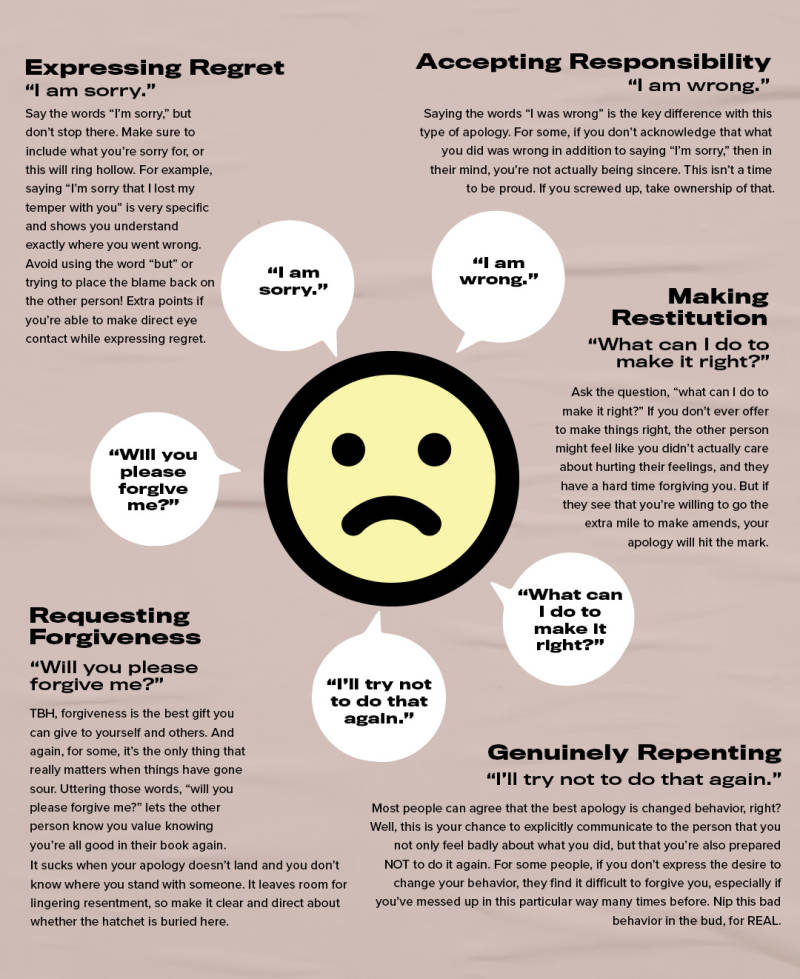Apology languages... scratching your head ‘cause you’ve never heard of these? Same! We’re new to the game, too. But after learning everything there is to know about communicating our love languages, we’re dying to become fluent in the languages of apology, too. If we’re being honest with ourselves, we all know that a good and genuine apology is more than just a simple “I’m sorry.”
Have you ever wondered why is it that for some people, saying those two little words just won’t cut it? And yet for some, when they’ve been wronged, hearing “I’m sorry” provides all the validation they need to move on. Quite frankly, all of us have experienced situations in which we have tried to apologize and were not successful even though we gave what we thought was our best effort, and vice versa with receiving. This boils down to which apology language you best respond to -- and understanding them can make the world of a difference when conflict arises with anyone, romantically or platonically.
Co-authors Gary Chapman and Jennifer Thomas explained in their 2006 book, The Five Languages of Apology, there are five distinct ways of expressing that you’re sorry. They came to this conclusion by asking millions of people two important questions: When you apologize, what you typically say or do? And when someone is apologizing to you, what do you want them to say or do?
So, what are they? Let’s break down each apology language and how you can take advantage of them!

Expressing Regret (“I am sorry.”)
Say the words “I’m sorry,” but don’t stop there. Make sure to include what you’re sorry for, or this will ring hollow. For example, saying “I’m sorry that I lost my temper with you” is very specific and shows you understand exactly where you went wrong. Avoid using the word “but” or trying to place the blame back on the other person! Extra points if you’re able to make direct eye contact while expressing regret.
Accepting Responsibility (“I was wrong.”)
Saying the words “I was wrong” is the key difference with this type of apology. For some, if you don’t acknowledge that what you did was wrong in addition to saying “I’m sorry,” then in their mind, you’re not actually being sincere. This isn’t a time to be proud. If you screwed up, take ownership of that.
Making Restitution (“What can I do to make it right?”)
Ask the question, “what can I do to make it right?” If you don’t ever offer to make things right, the other person might feel like you didn’t actually care about hurting their feelings, and they have a hard time forgiving you. But if they see that you’re willing to go the extra mile to make amends, your apology will hit the mark.
Genuinely Repenting (“I’ll try not to do that again.”)
Most people can agree that the best apology is changed behavior, right? Well, this is your chance to explicitly communicate to the person that you not only feel badly about what you did, but that you’re also prepared NOT to do it again. For some people, if you don’t express the desire to change your behavior, they find it difficult to forgive you, especially if you’ve messed up in this particular way many times before. Nip this bad behavior in the bud, for REAL.
Requesting Forgiveness (“Will you please forgive me?”)
TBH, forgiveness is the best gift you can give to yourself and others. And again, for some, it’s the only thing that really matters when things have gone sour. Uttering those words, “will you please forgive me?” lets the other person know you value knowing you’re all good in their book again. It sucks when your apology doesn’t land and you don’t know where you stand with someone. It leaves room for lingering resentment, so make it clear and direct about whether the hatchet is buried here.
As we stated up top, these guidelines are the perfect companion to the 5 love languages, and just like those, it’s okay if you have more than one preferred way of receiving remorse! We sincerely hope these apology languages help you figure out our next conflict in the healthiest way possible.
